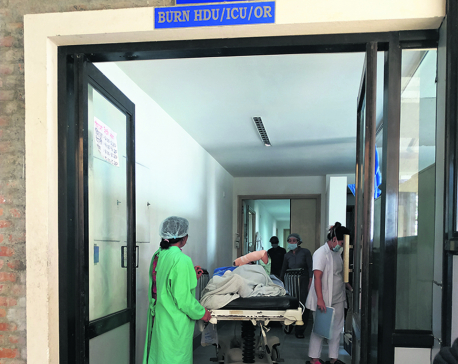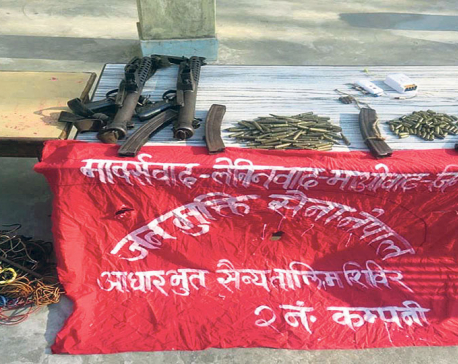
OR
From public harassment to acid attack, legal loopholes emboldening assailants
Published On: September 12, 2019 08:23 AM NPT By: Priyanka Adhikari

KATHMANDU, Sept 12: Acid attack survivor Muskan Khatun had endured months of harassment from her perpetrators before she was attacked with acid last Friday, family members said. Khatun was on her way to her school when three local youths splashed acid on her at Ganeshman Chowk in Birgunj. Police said Khatun had rejected ‘love proposal’ from of one of the attackers before she became their target.
Khatun’s case, the third incident of acid attack reported in one year, has drawn widespread condemnation and sparked debate about the role of the state, society and family members in curbing such crimes.
Months before the incident, the perpetrator had started following her and would often harass and eve-tease her in public places.
Rasul Ali, Khatun’s father, said that Khatun had even told her family members about the harassment.
Instead of knocking the police door, Ali personally warned them first. The trio then stopped harassing her for some time before getting started once again after 3-4 months.
Fed up with the regular harassment, Ali again warned them that he’d “break their legs” if they didn’t stop harassing Muskan. Only then did they say they would never tease her again.
Three months after the stern warning, the trio suddenly attacked Muskan with acid while she was on her way to school at around 6:00 in the morning.
Ali lamented that they could have avoided the attack had he lodged timely complaint with police about the harassment.
Muskan, a ninth-grader at Birgunj-based Tribhuvan Hanuman Secondary School, was a talented student with a passion for science. She wants to make a name for herself and help her family and society, Ali said.
When asked why didn’t he complain to the police about the repeated harassments, he said police seek evidences to charge people with harassment. That’s not practical in many cases, he added.
Muskan who is being treated at the ICU of Kirtipur Hospital has undergone surgeries in her two hands and chest until now. Her mother says, the family is waiting for next operation which is scheduled after two days.
In many respects, Khatun’s story shares a great deal of similarity with Samjhana Kumari Das who died in Kathmandu in September last year while receiving treatment for acid attack.
Despite stringent laws, acid attack has become far too common, especially in the tarai. Nepal’s constitution guarantees women and children protection from physical, mental, sexual, and psychological and any other forms of violence. Muluki Criminal Code of 2075 also condemns the act of harassment.
The problem lies with the implementation of laws, says lawyer Kishor Bista who has specialized in criminal law.
“Police also hesitate to take up such cases because harassment charges are difficult to prove,” he said.
Police officials said that complaints against harassments are rarely registered as parents or victims can hardly produce any evidence.
Superintendent of Police Kedar Dhakal from the Crime Investigation Branch, Teku said they have not received any complaints of harassment.
A survey conducted by #Iwalkfreely in Nepal campaign in 2016 collected over 1,000 responses and 98 percent of all women said they had been harassed. Nearly half of the participants who said they had faced harassment were between 20-29 years old, and 41 percent were between 13 and 19 years old. However, Nepali society fails to realize the gravity of harassment.
Lawyer Bista explains that there is a trend of sending harassers home after just warning them. The officials often discourage victims from filing a case citing legal hurdles. They are only found registering complaint when there is extreme pressure from the public.
Bista says that such practices eventually discourage the victims to seek justice through legal means and encourages assailants to repeat serious acts like acid attacks.
Ali says that their family is getting help from the government and support from public after the acid incident but that alone is not enough. He says, “When harassments aren’t taken seriously by police officers and anyone can possess items like acid, such crimes are bound to repeat again.”
You May Like This

Acid attack survivor Magar comes forward to support another victim
KATHMANDU, May 18: On February 22, 2015, Sangita Magar was attacked with acid by an acquaintance at Basantapur Durbar Square... Read More...

Man attacks wife with acid at Kalopul
KATHMANDU, May 16: A man has attacked his wife with acid in Kalopul on Wednesday evening. ... Read More...

Govt restricts Chand group’s activities
KATHMANDU, March 13: The government on Tuesday outlawed the ‘political activities’ of the semi-underground Communist Party of Nepal led by... Read More...




Just In
- Health ministry to conduct ‘search and vaccinate’ campaign on May 13
- Indian customs releases trucks carrying Nepali tea, halted across Kakarbhitta
- Silent period for by-election to begin from midnight
- SC issues short-term interim order to govt and TU not to take immediate action against TU legal advisor Khanal
- National consultation workshop advocates to scale up nutrition smart community in Nepal
- Patan High Court issues short-term interim order to halt selection process of NTB’s CEO
- NEPSE inches up 0.15 points; daily turnover increases to Rs 2.53 billion
- Bagmati Govt mandates tri-lingual signboards in offices














Leave A Comment